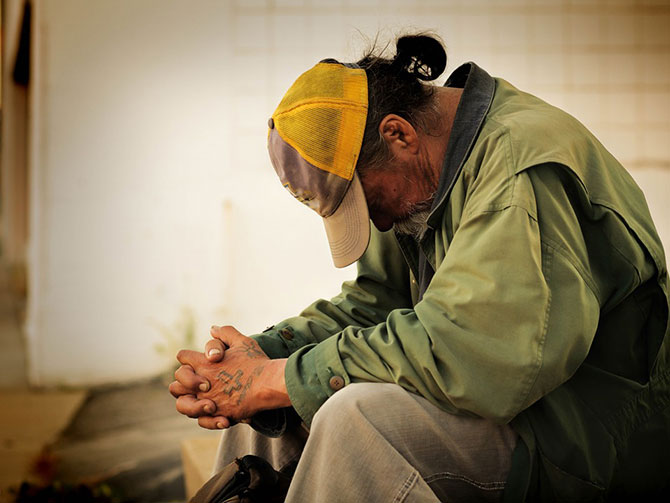
Elderly poverty – shocking but true!Do you know how it is to be broke?
A few years after retirement, I was down on my luck. I mean really down. All my business ventures failed, my retirement pension was almost depleted and I still had two kids in college.
It was horrible, to say the least, and thinking about those years gives me the chills.
That was several years ago. Though I am not completely out of the woods, I can see rays of sunshine filtering through the foliage around me. Now I have hope.
But what about those seniors who face grinding poverty, who can barely eat a square meal a day?
Oh yes, there are many. They are all around you and me. But we don’t notice them, even ignore them in a bit of self-denial.
Unbelievable but true facts about elderly poverty:
Over 25 million Americans aged 60 and above are living at or below the federal poverty line, according to the National Commission on Aging (NCOA). They are those who did not set aside sufficient funds while still actively employed. And the number is growing as more and more baby boomers retire each year – roughly 75 million a year.
A study done in 2006 by the Center for American Progress, showed that 9.4% of seniors were receiving a retirement income of $ 9,669.00’yr – way below the poverty threshold in the U.S.
Across ethnic lines, Afro-Americans bear the brunt of elderly poverty. Though they comprise 9% of the total elderly population in the U.S., 21% live below the poverty line; Hispanics come in next at 17%, and Asian-Americans, third – thanks to strong familial ties which make things a little bit easy, financially.
Regardless of ethnicity, to be poor is tough. It is to be deprived of healthy and nutritious foods, proper medical attention, a roof over one’s head, and many other disadvantages and needs.
To be poor is to be ignored by society, treated like an outcast. If you are poor, you don’t have a voice and influence; you lose your self-worth. You become dependent on dole-outs from people who take pity on you.
I know how it feels. I was there. It is traumatic not knowing where and when the next meal would come, and from whom.
If you are fortunate enough to never scrounge for food, or get behind soup lines, or beg, don’t be so smug about it. Instead, consider it a moral obligation to keep yourself above water, financially, and help those who are drowning.
Here are practical ways of doing it:
1. Don’t be a part of the problem:
The saying, “You can’t give what you don’t have,” is very appropriate in dealing with the elderly poverty in society.
To help others cope with money problems, be sure you have the capacity to help without risking your own financial well-being.
You can do this by sticking to your budget, making sure your obligations are current, and not spending more than you have to. Stick to your needs, not wants.
Any extra after all your expense and little savings, share it with those who have less.
Charity begins at home, in a manner of speaking. Besides, there are so many non-monetary ways of helping them, such as the following…
2. Empathize:
It is not easy to be old and poor. But they don’t want your pity and sorrow for their misfortunes. They need your understanding, your empathy.
It would ease their burden if you show that you care and understand their situation, not pity them for the mess they are in.
Help them in any way you can because you care, not because you pity them.
3. Help:
The most concrete way of showing empathy is to help by giving your time, money, and other resources such as food, medicines, and old clothes and belongings to ease the plight of needy seniors.
To avoid being misinterpreted, course your help or donations through organizations actively involved in helping elderly people in need.
I am sure there are such organizations in your place. Spend some of your spare time tending to soup kitchens or shelters for the homeless.
These acts of selflessness not only keeps you busy but also boosts your social consciousness standing in the community.
4. Join a fund-raising drive:
Join a fund-raising group, or initiate one within your circle of friends. Brainstorm ideas on how to help the needy elderly in your midst.
It can be a fun run, a cultural show, a per plate dinner, or anything that will provide value to the community and help those who are in need.
Not only will you be helping the needy, but you will earn feel-good dividends from such activities.
5. Use social media:
Social media has become the favorite and best way of disseminating information and awareness among its members. Put it to good use by taking the cause of elderly poverty.
Use it to increase people’s awareness about the plight of these marginalized members of society. Make them realize that it is not just about poor old people, but the entire community, as well.
Society is a microcosm of tiny little parts, with every bit affecting the whole in one way or the other, sooner or later. No matter how high you may be in the pecking order, ultimately the problem will get under your skin in the most unexpected and unpleasant ways.
Please share to make other seniors realize that there are other old people out there who can barely have a decent square meal a day.
Image: https://pixabay.com/en/people-homeless-male-street-850097/